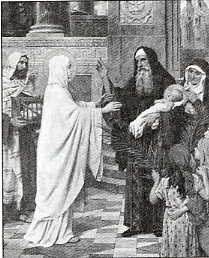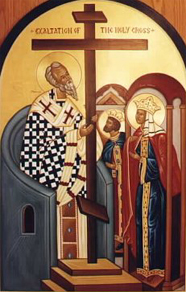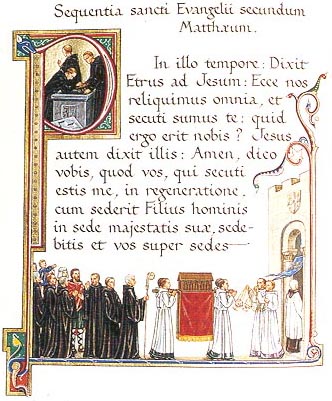
In Canto 21, of Il Purgatorio, there is a very felicitous, and at the same time, sad endounter between the poets, Dante and Virgil, with the Silver Age Roman poet Statius. The moment is happy in the sense that Statius, who is said to have converted to Christianity because of Virgil's poetry, and on account of this, Statius owes him a great debt of gratitude. It is a sad encounter, for we know that after Virgil has ascended to the Earthly Paradise, his role in Dante's (and perhaps Statius', too) is ended, and he must thenceforth take his place once again among the shades in Limbo, that region in hell where the Righteous Pagans abide. After all, even though he doesn't suffer the most cruel torments of the nether regions of hell, we are reminded that he is still a damned soul. The meeting between Statius and Virgil, therefore, is a bittersweet one.
Yet Virgil, damned as he is to live perpetually in Limbo, nonetheless has a job to accomplish for Dante: he must prepare him for that anticipated meeting with the woman who provided him with the inspiration for the journey-Beatrice-who stands here as an image of divine grace. This meeting will take place, with a flurry of processions and religious pageantry, in the Earthly Paradise, the very pinnacle of Mt. Purgatory (Canto XXXIII). All through the Inferno Virgil guided Dante, helping him to see sin and vice for what they really are. Lady Philosophy provides a similar guidance to Boethius in the Consolatione, weaning him away from the shadows (identifying fortune as the highest good) and to a knowledge of hi true end (happiness as the true summam bonum). Virgil similarly helps Dante to reorient his gaze, away from proximate goods, and towards the true highest good.
But how can Virgil, a damned soul, provide this service for Dante? To answer this question, we must remember that while damned, Virgil is nonetheless a righteous pagan. As such, he had mastered the natural, or cardinal, virtues: prudence, justice, temperance and fortitude. These virtues are called cardinal virtues (cardo-hinge) precisley because all other human virtues hinge on these four. Many pagans, for example, show knwoledge of what to do and what to avoid, thereby dispalying prudence. They might show excellence in giving everyone what is his due, and thus act with justice. They show great temprance in controling the appetites and moderating pleasure. Finally, a pagan can indeed show a firmness of spirit, doing his duty in the face of opposition and even death, and thus display fortitude. These virtues, in other words, are the highest that a person can achieve, apart from divine grace.
But the fact that they are achieved apart from gace makes them deficient, for, as good and noble as they are, they are not enough to restore humanity to its ultimate end-union with God. But he can lead Dante to the highest end of human proximate goods, by teaching him to imitate his hero Aeneas, who would not waver from his duty to show pietas by obeying the divine injunction to found the best of earthly cities, Rome. Likewise, Dante is helped by Virgil to attain to his ultimate end by setting earthly life in order by the cultivation of the cardinal virtues named above.
But to do that, he needed to be shown the utlimate end of sin and vice-the ninth circle, the circle of those who betrayed their lords (in this case, Satan, Judas Iscariot, Brutus and Casius). This circle is cold, and Satan, formerly Lucifer, is frozen and stiff, his flapping wings making this circle even colder. His only relationship to others is a consuming one, each of his three faces gnawing on the other traitors. Sin and vice end in this, a total breakdown in ecclesial and civic community. As a resident of hell, nonetheless inhabiting the circle of the righteuous pagans (in addition to his being the poet of the Augustan ascendency, and the Pax Romana that resulted from it), Virgil is Dante's best guide through the vices.
In Purgatory, however, Virgil is in unfamiliar territory. He does not quite have the same confidence he had in hell. Purgatory is a training ground for virtue, where the cardinal virtues are perfected by grace (Sayers). In lines 64ff, Virgil explains to Cato, who is now the guardian of Mt. Purgatory, the long journey through hell that brought them to this very moment of grace:
I've shown him Hell with all its guilty herd,
and mean to show him next the souls who dwell
Making purgation here beneath thy ward.
How I have brought him through, 'twere long to tell;
Power from on high helps me to guide his feet
To thee, to see and hear and mark thee well. (Divine Comedy, trans. by D. Sayers, Canto I, lines 64-69)
Right reason, represented by Virgil, prepares the soul for grace, and it is grace that expands, without destroying, the capacity of reason to ascend higher up the school of virtue known as Purgatory. The meeting with Cato of Utica, who is an image and type of the moral virtues (Sayers note, Canto I), is telling in this regard. Cato, though not a Christian in life, is nonetheless chosen as a "doorkeeper" to Mt. Purgatory.
These associations (natural and supernatural virtues) continue, and eventually meet, in the person of Statius. This is the most significant aspect of the meeting between Staius and Virgil, for Statius, once the pagan writer of The Thabaid, became, through Virgil's Fourth Eclogue, a follower of Christ. If Virgil represents the natural virtues, Statius represents those same virtues trnasformed by Christ through the infusion of the theological virtues of faith, hope and love. The appearance of Statius, then, signals a key point in Dante-the-Poet's transformation: he "authorizes the new vernacular Christian Dante-poeta in the process of defining himself over the course of the Commedia's story of Dante-protagonist." (Kevin Brownlee, "Dante and the Classical Poets," in R. Jacoff, ed. The Cambridge Companion to Dante Cambridge, 1993 p. 108)
In other words, there is a major poetic, as well as spiritual, shift. Virgil, that great celebrant of the great earthly city, gives way to a new poetry, taking all that was good of the old, but marshalling it now to a more excellent city-the city of God.



